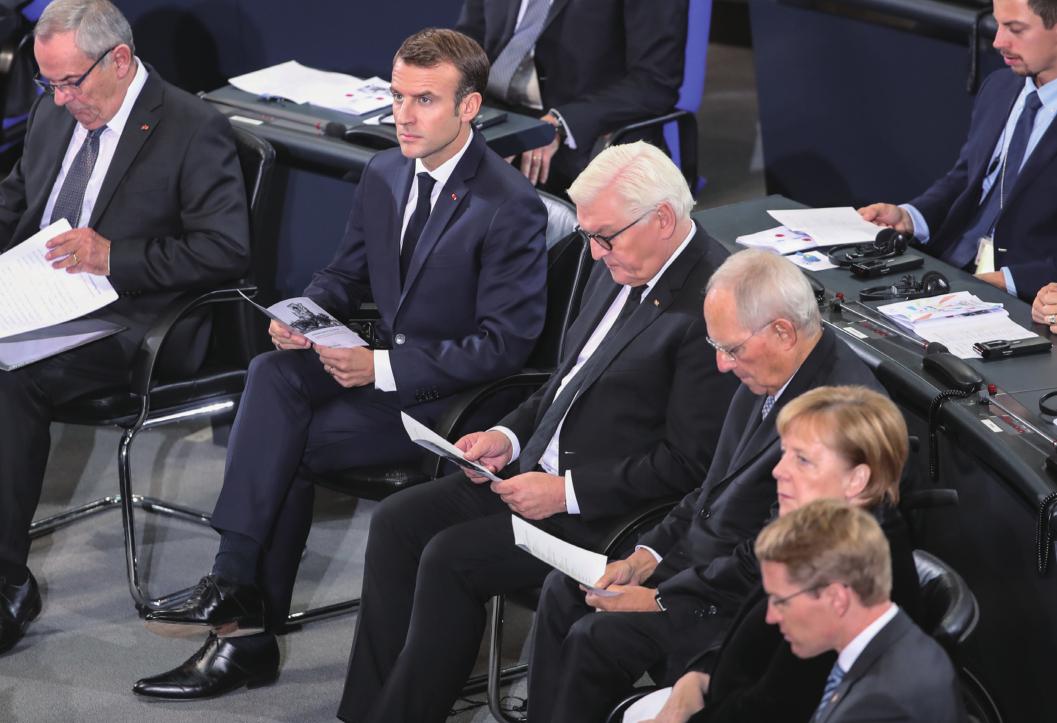U.S.Action, EU Reaction
2018-02-17ByXingHua
By Xing Hua

Ahead of the centenary commemora- tion of the end of World War I in Paris last month, an important time for the international community to draw lessons from todays peacekeeping efforts, French President Emmanuel Macron called for the formation of “a true European army” in a radio interview. In her address to the European Parliament, German Chancellor Angela Merkel echoed Macron, saying, “One day, we should work on a vision to create a real, true European army.”
The formation of a European army is doubtful as Europe faces serious challenges generated by the complicated and drastic changes in international relations. However, the two leaders holding high the European army banner for an independent European defense shows Europes growing dissatisfaction over the mounting U.S. unilateralism of the Donald Trump administration.
A long-standing pursuit
Europe has been pursuing an independent defense for a long time. Since the end of World War II, European countries have been exploring ways to achieve a joint defense and bring wars to an end, once and for all. The challenges of international situations, as well as the enhanced awareness of the need for an alliance and self-renewal of Europe have been pushing forward these efforts. However, inevitable practical difficulties make it impossible to achieve an overall independent European defense in a short time.
In 1952, six European countries, West Germany, France, Italy, the Netherlands, Belgium and Luxembourg, signed a treaty establishing the European Defense Community. But the treaty eventually failed as the French Parliament refused to ratify it, largely due to the rejuvenation of French nationalism.
The early 1980s witnessed a revival of the debate on European security. The Western European Union (WEU), which succeeded the 1948 Western Union, a European military alliance of France, the UK, the Netherlands, Belgium and Luxembourg, tried to promote consultations and cooperation in Western Europe. In 1984, a joint meeting of the WEU foreign and defense ministers adopted the Rome Declaration to reactivate the WEU, which also lifted all restrictions on Germanys participation in defense cooperation. It was the fi rst European military cooperation organization without U.S. participation, with France and Germany being its core powers. With mobilized troops, the WEU undertook tasks such as humanitarian relief and peacekeeping operations, and participated in peacekeeping operations in the Balkans.
After the Cold War, the European Economic Community, a torchbearer of European integration, was upgraded to the European Union (EU) in 1993. Common foreign and security policy and common security and defense policy were formulated as the second and third of the three pillars of the EU.
European defense was incorporated into the mainstream of European integration and gained more space for future development. The EU established political and security committees, military commissions, hired staff, and decided to develop a future European Rapid Reaction Force that would be self-reliant, deployable within 60 days and over 4,000 km, and sustainable in the field for a year. The EU countries are increasingly cooperating in peacekeeping operations in Africa and other regions. Defense capacity construction has become a signifi cant sector for the EUs integration. At the same time, NATO has been attaching more importance to its European members. The cooperation between the EU and NATO has become more institutionalized, establishing a strategic partnership.
Anti-Trump backlash
The recent talk to boost defense capacities with the establishment of a European army was triggered by the challenges posed by international situations and as a measure to cope with unilateralism. It is the result of Europes near loss of trust in the United States.
U.S.-Europe relations have experienced ups and downs, a key factor in stirring up the international situation. In the post-Cold War era, the EU began to feel anxious over the United States position as the worlds sole superpower, unwilling to be unconditionally at the command of the United States anymore. It started to sing a different tune on international security issues, such as the Iraq War and anti-terrorism measures after the September 11 attacks.
Still, the EU continues to attach importance to security alliances with the United States to safeguard common foreign interests. NATO and the EU expanded eastward to make joint efforts to contain Russia. They joined forces to conduct military interventions in some third countries such as Libya. The U.S.-Europe relationship remained stable in this era. Former U.S. President Barack Obamas administration maintained a relatively friendly relationship with Europe.
But since Trump took office in 2017, U.S.-European relations have deteriorated sharply. The extreme “America First” policy advocated by Trump has not only undermined European international governance arrangements, but also posed a serious threat to the European economy, politics, and even security. On security issues, besides urging the European allies to increase defense spending, the United States seldom has dialogue or consultation with them. It even announced that it would pull out of the landmark Intermediate-Range Nuclear Forces Treaty with Russia, putting its European allies in danger.
Europe is also reluctant to see the United States pushing NATO to strengthen combat readiness against Russia in Europe. At the same time, the United States is waging trade wars against Europe as if it were an enemy, with Germany, one of Europes leading countries, and Merkel as direct targets. In addition to its discouraging comments on European integration, the United States is also disregarding EU sovereignty by allowing its politicians to openly rally and incite right-wing forces in Brussels. All this has intensified the conflict between the United States and Europe to an unprecedented level, and even compromised the basis of their relationship. EU leaders cant help but wonder if Europe is still regarded as a strategic partner by the United States.
A tough job
France and Germanys efforts for an independent defense for Europe show Europes desire to be liberated from U.S. control. However, their proposal faces subject to structural challenges. Europes independent defense has to be, at least for now, within the NATO framework, which is based on a U.S.-Europe alliance. Trump was furious at the French and German proposal for a European army and French and German leaders had to explain that an independent European defense army was not against NATO, but a supplement to it.
Also, it would be difficult for France and Germanys proposal to get support in Europe. Some EU members are still following their Cold War era tradition of remaining neutral and would not join a EU defense cooperation. Some prefer the United States and NATO to an independent European defense for their defense. Still other European countries are NATO members and cannot be included in the EUs defense integration.
At present, a European army can be only a vision. An independent European defense effort is unlikely to make headway in the short term. But during Trumps tenure, the confrontation between the United States and Europe is likely to continue, providing more impetus for European countries to enhance their independent defense integration. Some practical steps are being taken in this direction. The establishment of the EU Defense Fund and the arms manufacturing cooperation within European countries are examples.
